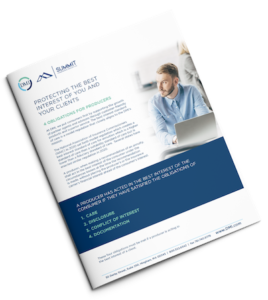The U.S. Department of Labor’s (DOL) Employee Benefits Security Administration (EBSA) recently implemented “Improving Investment Advice for Worker & Retirees,” an exemption for investment advice fiduciaries. The DOL’s definition of fiduciary is another regulatory requirement that retirement advisors act in the best interests of their clients and put their clients’ interests above their own. The exemption prevents advisors from concealing any potential conflict of interest and states that all fees and commissions for retirement plans and retirement planning advice must be clearly disclosed in dollar form to clients.
DMI, and its employees, were actively involved in advocacy efforts to prevent the inclusion of Independent Marketing Organizations (IMOs) in the definition of financial institutions and therefore subject to the regulation. Our advocacy efforts meant that we worked closely with outside legal counsel, carrier partners, industry organizations as well as sources close to the DOL and the legislative process. Whether we are working on advocacy efforts or day-to-day operations, DMI works in the best interest of you, our customers, and in the best interest of your clients.
As DMI works in the best interest of our customers, what does this new exemption mean for you as a fiduciary looking to give financial advice to your clients and operate in their best interest?
What does the Investment Advice exemption mean for your role as financial advisor?
The definition of who can give investment advice has expanded to include any professional making a recommendation or solicitation in this area. Previously, only advisors who were charging a fee for service (either hourly or as a percentage of account holdings) on retirement plans were likely to be defined as fiduciaries. The new proposed class exemption will apply to registered investment advisers (RIAs), broker/dealers (B/Ds), insurance companies, banks, and individual investment professionals who are their employees or agents.
The exemption prevents self-dealing and compensation from third parties in connection with transactions involving the Plans and IRAs.
Advisors who continue to receive a commission in circumstances where a conflict of interest could exist (such as the advisor receiving a higher commission or special bonus for selling a certain product) will need to ensure disclosures are completed and compliance is met.
Retirement Plans Subject to the Exemption Include:
- Defined-contribution plans: four types of 401(k) plans, 403(b) plans, employee stock ownership plans, Simplified Employee Pension (SEP) plans, and savings incentive match plans (simple IRA)
- Defined-benefit plans: pension plans or those that promise a certain payment to the participant as defined by the plan document
- Individual retirement accounts (IRAs)
With the expanded regulation, advisors and agents can use the traditional “five-part test” for determining fiduciary status. It is the responsibility of agents and advisor to use the five-part test to determine eligibility as a fiduciary.
Acting in the Best Interest of Clients
In the DOL’s eyes, this means the financial professional must act in the best interest of clients. The DOL says the proposed class exemption would require fiduciary investment advice to be provided in accordance with the following criteria: A best interest standard, a reasonable compensation standard and a requirement to make no materially misleading statements about recommended investment transactions and other relevant matters. In complying with SEC Best Interest Rule, advisers or other investment professionals will satisfy all three of these criteria.
For decades, Prohibited Transaction Exemption (PTE) known as PTE 84-24 has covered insurance agents and brokers and their affiliates to allow the sale of life insurance and annuities to qualified plans. In conjunction with the new exemption, 84-24 option remains available, and the DOL has recently clarified that PTE 84-24 also covers sales to IRA owners and commissions paid to insurance intermediaries as well.
This exemption is intended to correlate with the Securities and Exchange Commission (SEC)’s Regulation Best Interest (Reg BI) and the fiduciary duties under ERISA. This complicates matters as agent/advisor may be subject to state regulation, SEC BI, and the DOL regulation for acting in the best interest of clients.
No one is required to use this new exemption instead of pre-existing ones though there is a regulatory gray area as this new exemption is in effect in conjunction with the Reg-BI and state regulations guiding fiduciary responsibility.
DMI has compiled a guide and frequently asked questions documentation to support partner agents and advisors for the Reg-BI regulation.
Download DMI’s Best Interest Guide
Steps Towards Compliance
Additional guidance on how this regulation will impact producers is yet to be released by the DOL. The implementation of this exemption along with guidance from the DOL and carriers may impact what steps producers, partner agents and advisors will need to take to remain in compliance. However, for our proactive agents and advisors who are already reviewing their compliance, we suggest the following steps:
- Work with Carriers: Some carriers may require action and others will require producers to shoulder the responsibility of compliance. Issuing insurance companies are best positioned to produce standardized disclosures for their products.
- Explore what Disclosures You Will Need to Make: There a certain insurance products or situations where you will need to review your disclosures. For example, Fixed, non-indexed annuities may be recommended on a onetime basis, which would fail the “regular basis” part of the five-part test would not be fiduciary investment advice. However, if they are sold in the context of a broader relationship of providing advice on retirement investments, these sales may be subject to the fiduciary rules. Professionals selling these products should consider whether it is more appropriate to prominently disclaim fiduciary status, or to use PTE 84-24 disclosures.
- 84-24 PTE Review: Producers may want to familiarize themselves with the 2006 84-24 PTE – Prohibited Transaction Exemption regulation guidelines in addition to the exemption regulation.
- Check-in with your Compliance Team or Seek Legal Advice: As with any regulatory decision, check-in with a compliance partner or legal team to review how this regulation can impact your business in the short term until further guidance is issued.
Timeline for Compliance
The DOL referenced a temporary enforcement policy that effectively pushes the compliance deadline to December 20, 2021. It is expected that further regulation and guidance from the DOL in the coming months to clarify enforcement, and implications for producers.
DMI is ready to help you navigate the changing regulations that shape your business. We’re committed to providing our customers and your clients customer-focused products, award-winning marketing services, sales consulting, and operations support.
Additional References:
https://www.dol.gov/newsroom/releases/ebsa/ebsa20210212

